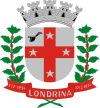Londrina
| Londrina, Paraná, Brazil | |||
|---|---|---|---|
| Municipality | |||
| The Municipality of Londrina | |||

Londrina in the afternoon
|
|||
|
|||
| Nickname(s): Pequena Londres ("Little London") / Capital do Café ("Coffee Capital") | |||
 Location in Paraná |
|||
| Location in Brazil. | |||
| Coordinates: 23°18′36″S 51°09′46″W / 23.31000°S 51.16278°WCoordinates: 23°18′36″S 51°09′46″W / 23.31000°S 51.16278°W | |||
| Country |
|
||
| State | Paraná | ||
| Mesoregion | Norte Central Paranaense | ||
| Microregion | Londrina | ||
| Founded | December 10, 1934 | ||
| Government | |||
| • Mayor | Alexandre Kireeff (PSD) | ||
| Area | |||
| • Total | 1,650.809 km2 (637 sq mi) | ||
| Elevation | 610 m (2,000 ft) | ||
| Population (2013) | |||
| • Total | 537,566 | ||
| • Density | 330/km2 (840/sq mi) | ||
| Demonym(s) | Londrinense | ||
| Time zone | BRT (UTC-3) | ||
| • Summer (DST) | BRST (UTC-2) | ||
| Postal Code | 86000-000 | ||
| Area code(s) | +55 43 | ||
| Website | Official website | ||
Londrina (Portuguese pronunciation: [lõˈdɾĩnɐ], literally Londoner) is a city located in the north of the state of Paraná, South Region, Brazil, and is 369 km away from the capital, Curitiba. Londrina was originally explored by British settlers, and then officially established in 1930 by a small group of Japanese and German settlers. It rapidly became the commercial, political, and cultural centre of the state’s northern pioneer zone. The city exerts great influence on Paraná and Brazil's south region. Londrina has approximately 500,000 inhabitants, being the second largest city in Paraná and the fourth largest city in the Southern Region of Brazil (after Curitiba, Porto Alegre and Joinville).
The city has an estimated population of 543,003 (IBGE, Sala de imprensa) and 818.300 in its metropolitan area.(IBGE, Sala de imprensa) It is a regional centre and is made up of commerce, services, agro-industries, and universities, including the State University of Londrina and the Federal Technological University of Paraná.
The city was named after British entrepreneurs who launched railroad stations in the region to ease the transportation of coffee grains from northern Paraná and southern São Paulo states to the port of Santos. The word Londrina, literally meaning "Londoner" or perhaps "Little London", pays homage to the British capital ( in Portuguese), since a Londoner cotton company, Paraná Plantations Limited, made the original investment to settle in this area. The city's population consists of descendants of those settlers, mainly from England and Scotland, plus Portuguese, Japanese, Italian, German, Polish, African, Spanish, Native, Lebanese, Ukrainian and Bulgarian Brazilians, as well as some Brazilians from other cities or states.
...
Wikipedia



